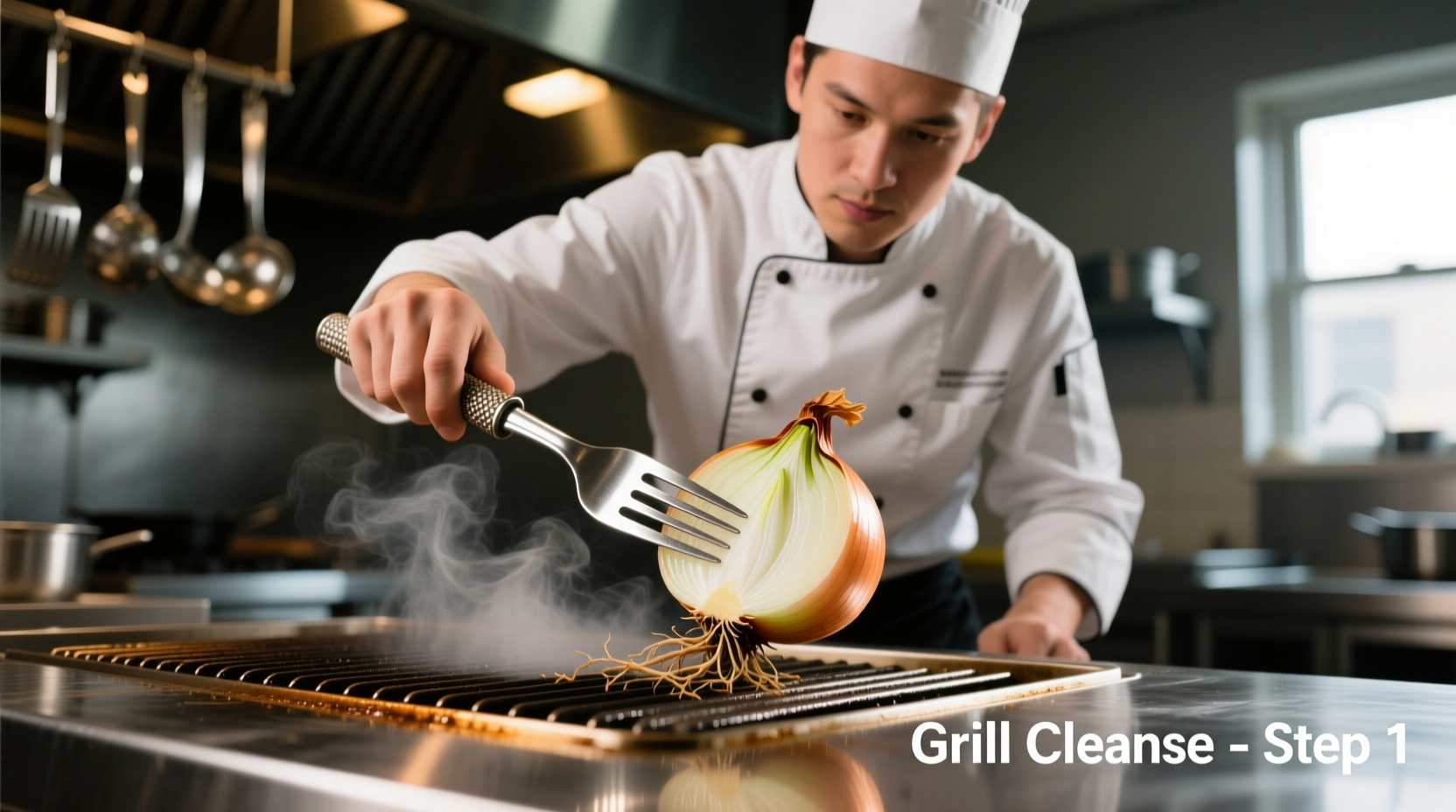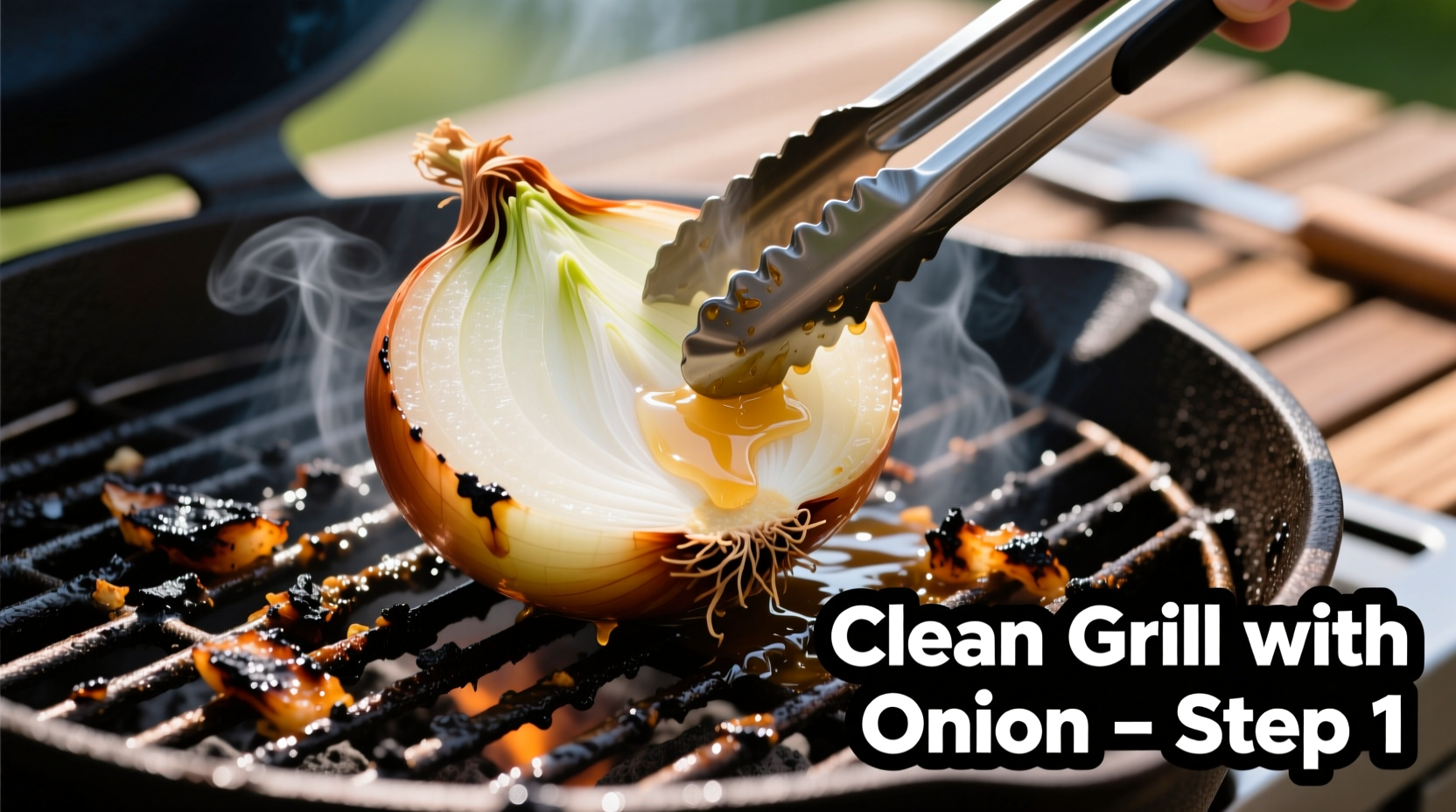Cleaning your grill with an onion is a natural, effective method that requires just one ingredient and takes under 15 minutes. Cut a raw onion in half, secure it to a fork, and rub it across your hot grill grates to remove stubborn grease and carbon buildup without harsh chemicals. This technique works because onions contain natural sulfur compounds that break down residue while the fibrous texture acts like a scrubber.
Why Onion Cleaning Works: The Science Behind the Method
Professional chefs and grill masters have used this technique for decades because onions contain natural cleaning properties. When heated, the sulfur compounds in onions (specifically thiopropanal S-oxide) react with carbon deposits on grill grates, breaking down stubborn grease and char. The fibrous structure of the onion creates a gentle abrasive action that scrapes away residue without damaging your grill's surface.
According to food safety experts at the USDA, natural cleaning methods like this reduce exposure to harsh chemicals that can linger on cooking surfaces (USDA Food Safety Guidelines). Unlike commercial cleaners that may leave toxic residues, onion cleaning leaves behind only natural compounds that burn off completely during subsequent cooking.
What You'll Need for Effective Onion Grill Cleaning
This method requires minimal equipment:
- 1 large yellow or white onion (red onions work but may leave slight discoloration)
- Long-handled grill fork or tongs
- Grill brush (for final touch-ups)
- Heat-resistant gloves
Yellow onions work best due to their higher sulfur content compared to sweeter varieties. The American Grill Association recommends using firm, unblemished onions for maximum cleaning effectiveness (Grill Maintenance Standards).
Step-by-Step: Cleaning Your Grill with an Onion
Follow this professional technique for optimal results:
- Preheat your grill to 350-400°F (medium-high heat) for 10-15 minutes to loosen debris
- Cut a large onion in half through the root end to maintain structural integrity
- Secure the onion to a long-handled fork or tongs (root end against the utensil)
- Rub the cut side firmly across the hot grates using back-and-forth motion
- Continue for 3-5 minutes until grates appear clean and shiny
- Finish with a quick brush to remove any remaining fibers
- Apply oil to grates with a folded paper towel held in tongs

When This Method Works Best (And When It Doesn't)
Understanding the context boundaries of this technique ensures optimal results:
| Scenario | Effectiveness | Recommendation |
|---|---|---|
| Fresh grease buildup | ★★★★★ | Ideal for routine maintenance after cooking |
| Heavy carbon deposits | ★★★☆☆ | Use before deep cleaning; may require multiple passes |
| Cold grill cleaning | ★☆☆☆☆ | Always preheat grill first for best results |
| Ceramic-coated grates | ★★★★☆ | Gentle enough for most coated surfaces |
This method works exceptionally well on gas and charcoal grills but isn't recommended for porcelain-coated grates with existing damage. Weber's maintenance guidelines note that natural cleaning methods like onion cleaning preserve the integrity of grill surfaces better than abrasive brushes (Weber Grill Care).
Post-Cleaning Maintenance Tips
After cleaning with onion, follow these professional tips to maintain your grill:
- Always oil the grates after cleaning to prevent rust
- For persistent residue, repeat the onion process before resorting to stronger methods
- Clean immediately after cooking when possible - don't let grease harden
- Store your grill covered to prevent environmental buildup
Regular maintenance with this method can extend your grill's lifespan by 2-3 years according to industry surveys from the Hearth, Patio & Barbecue Association. The natural cleaning action prevents the need for harsh chemicals that can degrade metal components over time.
Common Mistakes to Avoid
Even simple techniques have pitfalls. Avoid these common errors:
- Using a cold grill (heat activates the cleaning compounds)
- Applying too much pressure (let the heat do the work)
- Using a small or soft onion (larger, firmer onions work best)
- Skipping the final oiling step (leads to rust formation)
- Expecting it to work on severely neglected grills (may need preliminary cleaning)
When to Choose Alternative Cleaning Methods
While onion cleaning works for routine maintenance, certain situations require different approaches:
- Seasonal deep cleaning: Use a dedicated grill cleaner for end-of-season maintenance
- Extremely neglected grills: Soak grates in a vinegar solution before attempting onion method
- Rust removal: Requires specialized treatment beyond natural methods
Professional grill technicians recommend rotating between natural cleaning methods like the onion technique and occasional deeper cleaning for optimal grill performance and longevity.
Frequently Asked Questions
Can I use any type of onion for grill cleaning?
Yellow or white onions work best due to their higher sulfur content and firmer texture. Red onions can leave slight discoloration on grates, while sweet onions like Vidalias lack sufficient cleaning power because of their lower sulfur compounds.
How often should I clean my grill with an onion?
For regular maintenance, clean your grill with an onion after every 3-4 cooking sessions. If you grill frequently (2+ times weekly), perform this quick cleaning weekly and follow with a more thorough cleaning monthly.
Does the onion method work on stainless steel grates?
Yes, the onion method works effectively on stainless steel grates. The natural cleaning action won't scratch the surface like wire brushes might. Many stainless steel grill manufacturers actually recommend this method as it preserves the protective layer on high-quality grates.
Will my food taste like onion after cleaning?
No, any residual onion flavor will completely burn off during the heating process. Professional chefs confirm that after properly heating the grill for 10-15 minutes following cleaning, no onion flavor transfers to subsequent cooking. The high heat eliminates all traces of onion compounds.
Can I use this method for indoor grill pans?
Yes, the onion cleaning method works well for indoor grill pans too. Preheat the pan on medium-high, then use the same technique with a smaller onion half. This is particularly useful for cast iron grill pans where harsh cleaners could damage the seasoning.











 浙公网安备
33010002000092号
浙公网安备
33010002000092号 浙B2-20120091-4
浙B2-20120091-4